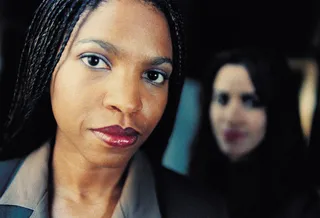What’s Really Behind the AIDS Epidemic in Black America?
BET.com explores what makes us more vulnerable.

1 / 10
What's Fueling HIV? - Why is it that African-Americans are so disproportionally impacted by the HIV/AIDS epidemic? BET.com explores what is going on in the Black community that makes us more vulnerable. (Photo: Getty Images/ STOCK)

2 / 10
Gaps in Quality Health Care - While Obamacare is doing its best to provide health insurance to the most vulnerable communities, generations of Black people are disproportionately uninsured and it helps fuel HIV in this country. (Photo: Joe Raedle/Getty Images)

3 / 10
Disproportionate Poverty - In 2010, the Centers for Disease Control and Prevention found that the largest risk factor for HIV in America was poverty. Poverty limits your access to quality health care, health literacy, HIV testing, overall education and housing, which all have been linked to HIV transmission. (Photo: Shashank Bengali/MCT/Landov)

4 / 10
Homophobia - Homophobia exists among all races and ethnicities, but it’s important to point out that in our community the price of that homophobia is incredibly high. The constant degradation of gay and bisexual men plays a role in their self-esteem and mental health, which can lead to risky behaviors. (Photo: REUTERS/James Aken)

5 / 10
High Rates of Untreated and Undiagnosed STDs - According to a 2009 CDC study, Blacks represent 13 percent of the U.S. population, but accounted for about 71 percent of reported gonorrhea cases and almost half of all chlamydia and syphilis cases. Untreated and undiagnosed STDs lower your immune system, which can put you further at risk for contracting HIV. (Photo: Mario Tama/Getty Images)
ADVERTISEMENT

6 / 10
Gender Inequality - Whether it’s domestic violence, not being able to negotiate condom use with male partners or having to trade sex for necessities, gender inequalities increase our risk of HIV by taking away a woman’s choice to make decisions about whether or not she uses condoms. (Photo: Getty Images/ STOCK)

7 / 10
Lack of Needle-Exchange Policies - One impactful way that has been proven to decrease HIV infections among this community is needle-exchange programs. The lack of these policies in some communities further puts people at risk. (Photo: REUTERS/Gustau Nacarino GN/CRB)

8 / 10
Mass Incarceration - Mass incarceration fuels HIV because it takes men out of the community, creating an imbalance between available men to women in a certain community. If men are having unprotected sex with multiple partners, it increases the risk of contracting and spreading HIV. (Photo: Birmingham News /Landov)

9 / 10
Lack of Comprehensive Education - Since 1997, our federal government has invested almost $1.5 billion in abstinence-only education, while numerous studies have shown that these programs are completely ineffective in delaying sex. (Photo: ROBYN BECK/AFP/Getty Images)
